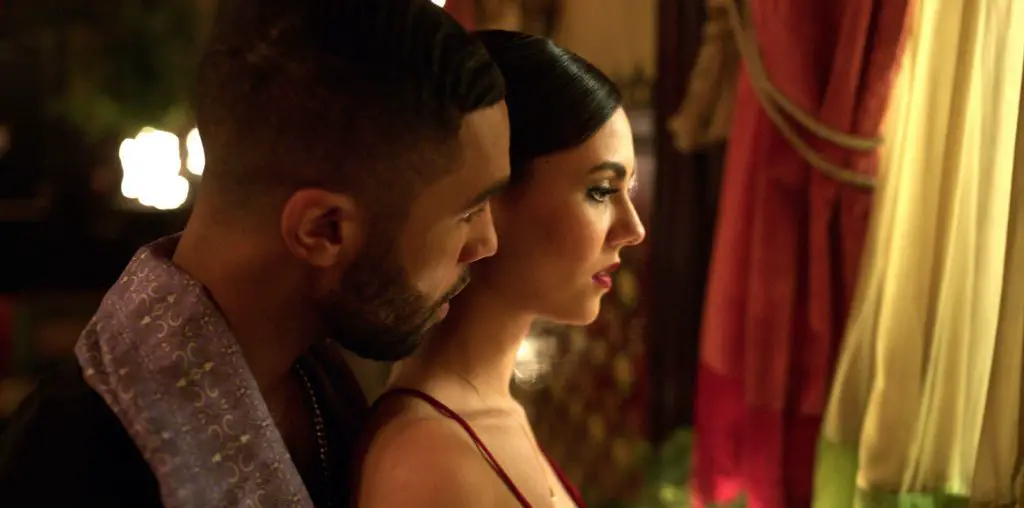
Unfairly or not, Zhang Yimou’s newest stunning epic, “Hero,” will be seen through the prism of Crouching Tiger, Hidden Dragon, and that’s really too bad.
Of course, the filmmakers are asking for it. Like the superior Crouching Tiger, Ang Lee’s watershed movie that introduced the martial arts genre to a whole new audience in the West, “Hero” — which was nominated for an Academy Award for Best Foreign Film (it lost to Germany’s “Nowhere in Africa”) and won an award for innovation at the Berlin International Film Festival — is carefully crafted on a stunningly filmed palate, features a melancholic musical score by Tan Dun and a supporting role by China’s leading muse, Zhang Ziyi. Even the star of “Hero,” Jet Li, turned down the role in CTHD that eventually went to Chow Yun-Fat.
But “Hero” is not a CTHD clone; it’s a wonderful movie in its own right, staking its own territory as a dreamlike meditation on motivation and love. It even has an interesting political message that we Americans can take to heart in these troubled times. Played out on a luscious canvas, courtesy of cinematographer Christopher Doyle, the heroes of “Hero” seem more like Greek gods battling in the Heavens rather than the pained mortals of Lee’s international hit.
Set 2,000 years ago (3 rd century B.C.) as China was in the process of being united by the brutal conqueror Qin, who would eventually become the first emperor of China, the film opens when a minor official, Nameless (Li), seeks an audience with Qin after having killed the three assassins that have been trying for Qin’s life for years. Qin accepts the audience, then asks Nameless to tell him how he killed three such skilled warriors.
Nameless then recounts the story of how he disposed of Sky (Donnie Yen of Iron Monkey), and two lovers, Broken Sword and Flying Snow (Tony Leung and Maggie Cheung), super-skilled assassins who are hiding out in a calligraphy school. Broken Sword is fiercely protected by his protégé, the young and beautiful Moon (Zhang Ziyi).
Thing is, Qin doesn’t believe Nameless, suspecting the story is not a simple as all that. Sensing a different motivation in Nameless’ act, the future emperor tells his own version of events, based on his observational evidence.
In fact, the legend of Nameless, Broken Sword, Flying Snow and Moon is told in four different versions, “Rashomon”-style. Each different section features a bold color scheme. In Nameless’ version of events, each costume and set is in blood red. In Qin’s version, the costumes and sets are in blue. In the version that is a compromise of the two, presumably the most truthful version of events, the design is all white. There is even a lovely green palate during a flashback sequence.
As one would expect when one of the world’s great directors and one of the world’s great cinematographers are teamed, “Hero” is indeed a visual feast. The fight scenes, choreographed by Ching Siu-tung (“A Chinese Ghost Story,” “Swordsman II”) with the help of flawless digital technology, are truly impressive – especially the early showdown between old fighting pros Li and Yen. Yet those who were won over by Ang Lee’s strong story in Crouching Tiger, Hidden Dragon are bound to be disappointed by “Hero’s” resistance to traditional narrative.
Perhaps it will help to think of “Hero” as poetry, and CTHD as a narrative story. The heroes in CTHD were human, based in “reality” – there’s a real town with real peasants at a real time and place. The tightly structured screenplay allows for traditional character development. But “Hero” is more ethereal, with places about as real as those in Lord of the Rings. In fact, “Hero” seems to take place in some sort obscure, Asian version of Middle Earth. It is a fantasy, with a beauty all its own. If a comparison has to be made, think Wong Kar-Wai’s Ashes of Times, also shot by Doyle.
Zhang Yimou, at the Western premiere of the film in Berlin, was frank about his debt to Crouching Tiger, saying that without its success, “Hero” couldn’t have been made. He said Miramax approached him after Ang Lee’s film became a phenomenon, showed interest in a project Zhang had started in 1998 and threw a $35 million budget at him. Add the fact that Zhang, who had never made a martial arts film before but had been inspired by them since he was a child, could work with Jet Li and Maggie Cheung, two actors he had admired for some time, and it was a no-brainer.
Zhang’s place in cinema history is assured, having specialized in telling China’s history from a rural peasants’ point of view, most notably with a string of movies made in the early ‘90s with his former muse, Gong Li, which include “Raise the Red Lantern” and “Ju Dou.” He discovered Zhang Ziyi, whose first film was his excellent The Road Home, then suggested her to Lee when he was casting Crouching Tiger.
So it comes as no surprise that “Hero” is something more than action film, with many hidden messages about Chinese life and current government policy. With every slice of the sword, every stroke of the calligraphy brush, every sweep of the camera, “Hero” builds on itself to become an assured, loving cinematic tone poem to the martial arts genre.
